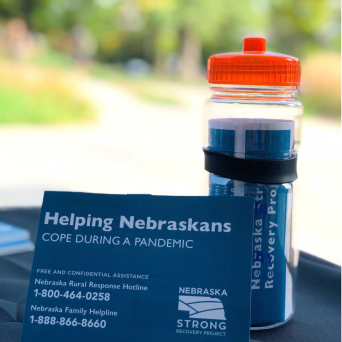One day it was Loup City’s Polish Days or Grand Island’s Husker Harvest Days. Other days it was a college campus visit on game day, a preschool reading session or one of Two Rivers Public Health’s vaccination clinics.
In all of those places across 22 counties in south-central Nebraska, the Nebraska Strong Recovery Project Region 3 team met people and offered crisis counseling and other resources for those struggling because of COVID-19.
“We focused on self-care and what to do when you’re anxious—anxious about wearing a mask or going back to school,” said Caleb Davis, the region’s disaster behavioral health coordinator.
The most successful efforts reaching people in the community, he said, have been when other agencies invited the Nebraska Strong outreach workers to join the team or be part of their events. “People wanted to be there and wanted to talk to us,” Davis said.
The Nebraska Strong project originally formed after the state’s 2019 flooding. The project in 2020 received $6.7 million in new federal grants to focus on COVID-19.
The project, scheduled to continue through December, is a collaboration of the Nebraska Department of Health and Human Services, the University of Nebraska Public Policy Center, the Nebraska Emergency Management Agency and the state’s six behavioral health regions.
The pandemic turned out to be a disaster unlike any other, said Aaron Adams, network program specialist at DHHS’s division of behavioral health.
“Usually, a disaster affects very specific families or locations, but this was everyone, including the outreach workers themselves,” Adams said. “The scope was much broader than other situations.”
The project’s outreach workers, he said, “really rose to the challenge to find ways, whether virtually or in person, to support people.”
Adams said he was continually impressed by each regional team’s ability to be flexible and creative to adapt to the needs they saw.
COVID-19 is a polarizing topic, he said, and communities needed to be approached according to, for example, how open local businesses were to masked outreach workers or to displaying information about coping with the pandemic.
In many cases, outreach workers said, the common ground was a focus on stress and anxiety, whatever the source, and on paying attention to self-care and neighbors in need.
Adams said the Region 3 Nebraska Strong team has had the challenge of covering sprawling rural areas as well as the population centers of Grand Island, Hastings and Kearney. The outreach workers attended a wide array of events ranging from library reading times and towns’ celebratory days to chamber of commerce meetings and vaccination clinics to get out materials about Nebraska Strong.
The project’s printed materials, whether business cards, postcards, posters, flyers, brochures or children’s coloring pages, offer coping tips and advertise the Nebraska Family Helpline (1-888-866-8660) and the Rural Response Hotline (1-800-464-0258). Both statewide hotlines will continue to offer support to Nebraskans after the grant supporting the Nebraska Strong Recovery Project ends on December 26.
Region 3 sends out monthly newsletters and outreach workers can see from tear-off sheets posted on bulletin boards that people have taken information that way.
Davis said outreach workers during flooding had done a lot of door-to-door work then had to adapt during the pandemic to reach people over Zoom meetings and social media. Then, after vaccinations made many people feel safer, the workers pivoted to being out and about on city streets and at events.
Often, Davis said, people would say they were fine but offer up that a neighbor was struggling and that opened a door to sharing what kind of help is available.
Mental health services are scarce in rural Nebraska and the isolation caused by the pandemic has taken a toll, said Katie Mulligan, planning section supervisor at the Two Rivers Public Health Department.
The waiting period after COVID-19 vaccinations gave Nebraska Strong outreach workers a chance to talk to people about how they were doing, answer their questions and make referrals for assistance.
No other program or agency has people who can visit homes the way the Nebraska Strong outreach workers do, Mulligan said, and she is worried about losing them after December.
“I hear the anecdotal stories,” she said. “I think they’re doing good work.”
Author: Deb Shanahan

